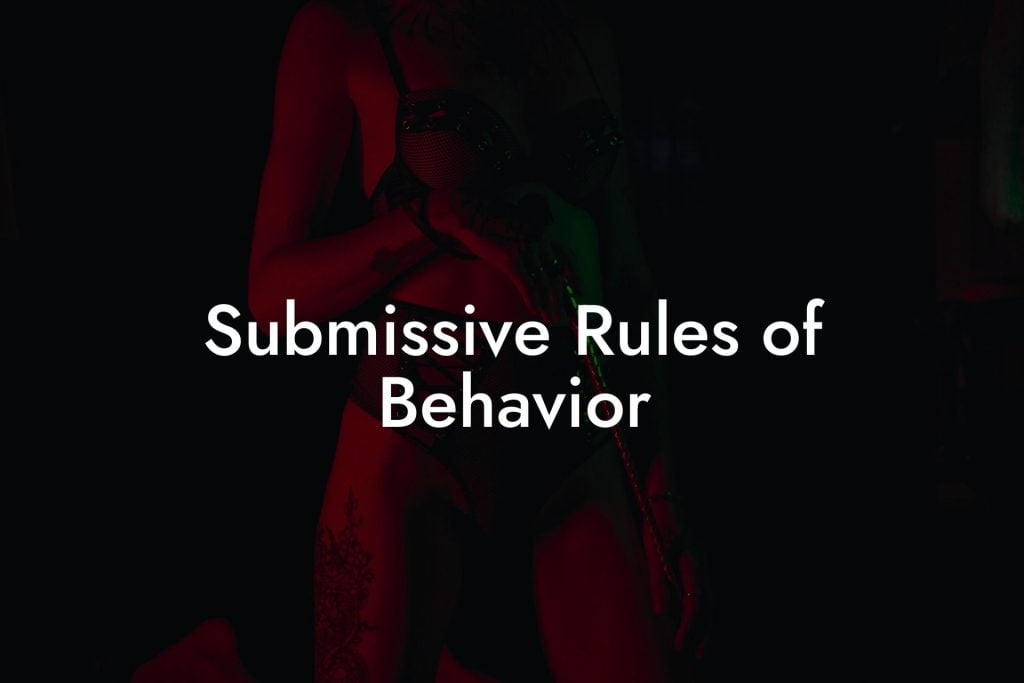Being a submissive in the BDSM lifestyle is a thrilling experience that requires trust, communication, and a deep understanding of one's desires and boundaries. Whether you're new to BDSM or looking to enhance your submissive journey, this article will outline essential rules and principles that every BDSM sub should consider. From consent and communication to the importance of setting boundaries, we aim to provide you with valuable insights and ensure a safe and fulfilling D/s (Dominant/submissive) relationship.
In any BDSM relationship, consent is the cornerstone of trust and respect. It’s more than just saying “yes” or “no”—it’s about openly communicating your desires, limits, and expectations. But trust doesn’t end with a conversation—it’s built through ongoing, clear agreements. That’s where our Dominant & Submissive BDSM Contract Pack comes in. Find out more →
Consent and Communication
In any BDSM dynamic, consent is paramount. Every interaction, scene, or power exchange should be based on enthusiastic and informed consent from all parties involved. Submissives must clearly communicate their boundaries, limits, and any hard limits that should never be crossed. Establishing a safe word or signal is crucial to ensure that the dominant understands when to stop or adjust their actions. Open and ongoing communication throughout the relationship is key to building trust and ensuring both partners' needs are met.
Establishing Boundaries
Setting boundaries is vital for the emotional and physical well-being of every sub. This includes defining limits regarding pain thresholds, types of play, and specific actions that may trigger negative emotions or traumas. Submissive partners should express their limits and discuss them with their dominant, ensuring that both parties are comfortable and aware of what is acceptable and what is not. Remember, boundaries can evolve over time, so continuous dialogue is crucial.
Maintaining Self-care
Self-care is not just essential for dominants, but also for submissives. While the power exchange dynamic may involve moments of surrendering control, it's crucial for submissives to take care of their physical and emotional needs. Establishing self-care routines and practices, such as meditation, journaling, exercise, or engaging in hobbies, can help submissives maintain a healthy mindset and ensure their well-being outside of BDSM dynamics.
Building Trust
Trust serves as the foundation of any successful D/s relationship. Submissives should trust that their dominant will respect their limits, listen to their needs, and prioritize their safety and well-being. Regular check-ins, discussing expectations, and establishing protocols for communication and behavior can strengthen the bond between sub and dom. It is essential to understand that trust must be earned, and it's the responsibility of both parties to maintain it throughout the relationship.
Looking for the best BDSM & Kink OnlyFans content creators? Here is a list of of our favourites that you will love:
-
- Best BDSM & Fetish OnlyFans - Molly✨ >> Link
- Best BBW & Huge Ass OnlyFans - Naughty Hanna Zimmer 💜🎀 >> Link
- Best Sexy Gaming Nerd OnlyFans - 🎮 Gracy EstuSWEET 🎮 >> Link
- Best Fetish & Kink Messaging OnlyFans - 💫Lola La Fleur 💫 >> Link
- Best Girl Next Door OnlyFans - ☀️Lily ⛅ >> Link
- Best Tiny European OnlyFans - 💝 Ami Allison 💝 >> Link
- Best Cosplay OnlyFans - 🐱 Little Kitty Kate 👉👌 >> Link
- Best Little OnlyFans - 🧸 Katya 🙇♀️ Sun >> Link
- Best Sub OnlyFans - 🍌Hanna Banana🍌 >> Link
- Best Teen & Huge Tits OnlyFans - ❣️Anny❣️19 y.o. BUSTY student girl >> Link
- Best Tiny Tits OnlyFans - ⍣⭐️ Sofia Parker ⭐️⍣ >> Link
- Best Sub & Huge Boobs OnlyFans - Nika Huge Boobs >> Link
- Best Kink OnlyFans - Sofia💖 >> Link
- Best Fetish & Girl Next Door OnlyFans - Hillary is Wet 💦 >> Link
- Best Dirty Latina OnlyFans - Paula Flores 😈 >> Link
Not quite what you are looking for? View the full list →
Frequently Asked Questions
What is a BDSM contract?
A BDSM contract is a written document that outlines the terms and conditions of the relationship between participants in BDSM activities. It generally details the roles, responsibilities, limits, safewords, and duration of the relationship, among other aspects. It serves as a tool to ensure that all parties have a clear understanding of their agreement and consent to the power exchange dynamic inherent in their BDSM interactions.
Why is consent so crucial in BDSM?
Consent is the cornerstone of all BDSM activities. It ensures that all parties involved have a mutual understanding and agreement about what will occur, and it respects the autonomy and personal boundaries of each participant. Informed, enthusiastic, and continuous consent is necessary to maintain the safety and trust that are crucial in BDSM dynamics.
How do BDSM contracts address consent?
BDSM contracts articulate the terms of consent between the parties, detailing what activities are permissible and identifying hard and soft limits. They provide a framework for ongoing discussion and negotiation, ensuring that consent is obtained and respected throughout the relationship.
What are ‘hard’ and ‘soft’ limits?
Hard limits are non-negotiable boundaries that one or more participants will not cross under any circumstances. Soft limits are areas of BDSM play that a participant might be hesitant about or may require certain conditions to explore. Understanding and respecting these limits is paramount for a safe and enjoyable experience for everyone involved.
What is a ‘safeword’?
A safeword is a pre-agreed word or signal that participants in BDSM use to communicate the need to slow down, pause, or stop the activity immediately. It's an essential safety mechanism to ensure that all play remains consensual and under control.
Do all BDSM interactions require a contract?
While not all BDSM interactions require a contract, it is highly recommended for long-term or more serious BDSM relationships, especially those involving complex power dynamics. A contract can also help casual play partners to communicate and agree on expectations more clearly.
Can a BDSM contract be legally enforced?
In most areas, BDSM contracts are not legally binding documents. They are meant to be symbolic agreements that foster trust and communication between participants. That said, certain aspects of a contract, if broken, could lead to legal consequences depending on the laws of the jurisdiction and if any actions go beyond consensual activities.
Is a BDSM contract ever considered a legal risk?
A BDSM contract could pose a legal risk if it includes activities that are illegal or if it is used to argue that a person consented to something they later report as assault or abuse. It is always essential to keep BDSM activities within the bounds of the law and to be aware of the legal implications in your area.
How does trust factor into BDSM?
Trust is a critical component of BDSM. Participants must trust one another to respect their limits, care for their well-being, and adhere to the agreed-upon structure of their dynamic. Without trust, the risks of both physical and emotional harm can increase significantly.
Can a BDSM contract be modified?
Yes, BDSM contracts can and should be reviewed and modified regularly to adapt to the evolving preferences, limits, and circumstances of the participants. Communication is key, and amendments should always be made with the consent of all parties involved.
Are BDSM contracts only for long-term relationships?
No, BDSM contracts can be useful in both long-term relationships and short-term arrangements. They serve to set boundaries, expectations, and the scope of the relationship regardless of its duration.
Is experience in BDSM necessary to create a contract?
While experience can provide useful insight into personal preferences and boundaries, it is not strictly necessary to create a BDSM contract. Indeed, creating a contract can be an excellent exercise for novices to thoroughly explore their desires and establish their limits. However, it is often advisable to solicit advice or guidance from more experienced practitioners when drafting a contract.
How specific should a BDSM contract be?
A BDSM contract should be as specific as possible, including details on activities, limits, safewords, and the expectations of each participant. Specificity helps prevent misunderstandings and ensures a consensual and safe experience.
What happens if someone breaks a rule in the contract?
If a rule in the contract is broken, it should be addressed as soon as possible. The parties should discuss the breach's context and impact, and decide on the appropriate course of action. Consequences may range from discussing and reinforcing boundaries to terminating the BDSM dynamic, depending on the seriousness of the breach and the wishes of the parties involved.
How is aftercare incorporated into a BDSM contract?
Aftercare, the practice of attending to one another's emotional and physical needs after a BDSM scene, can be outlined in the contract. This may include specifics on the type of aftercare required, its duration, and the responsibilities of each party in providing it.
Should a BDSM contract keep privacy considerations in mind?
Yes, privacy is extremely important within BDSM contracts, as disclosing information about the relationship or scenes without consent can be damaging and is often a serious breach of trust. The contract should clearly specify how privacy will be protected and any agreed-upon exceptions.
How does a beginner in BDSM ensure their safety when negotiating a contract?
Beginners should educate themselves on BDSM practices, communicate openly about their limits and desires, and potentially engage with knowledgeable members of the BDSM community for guidance. Contracts should be negotiated without coercion, and with the understanding that anyone can withdraw consent at any time.
Can psychological aspects of BDSM be included in a contract?
Yes, psychological aspects such as triggers, emotional limits, and the mental state of participants can be addressed within a BDSM contract. This ensures that all parties are cognizant of and respectful towards the mental health considerations of the dynamic.
How do you ensure that a BDSM contract is understood by all parties?
It's crucial that all parties thoroughly discuss and agree to the terms before entering into a BDSM contract. Each participant should have the opportunity to ask questions, request clarifications, and express concerns. Adequate time should be given to ensure everyone's understanding and agreement.
What should be done if someone's limits change during a BDSM relationship?
If an individual's limits change, it is essential to communicate this as soon as possible. The contract should then be revisited, and the necessary adjustments made to reflect these new limits, with all parties re-affirming their consent.
How can a BDSM contract reflect the dynamic nature of a relationship?
A BDSM contract can include provisions for regular check-ins and renegotiations to account for the fluidity of personal boundaries and the evolution of the relationship. This ensures the contract remains relevant and respectful of each participant's needs.
Remember, being a submissive is about exploring and embracing your desires and boundaries in a consensual and safe manner. Whether you're new to BDSM or an experienced submissive, our Filthy Adult Ultimate BDSM Contract Pack can provide a solid foundation for your dynamic. Don't forget to check out our informative guides, explore our fetish shop, and share this article with fellow kink enthusiasts. Stay safe, communication, and embrace the beautiful world of BDSM.













